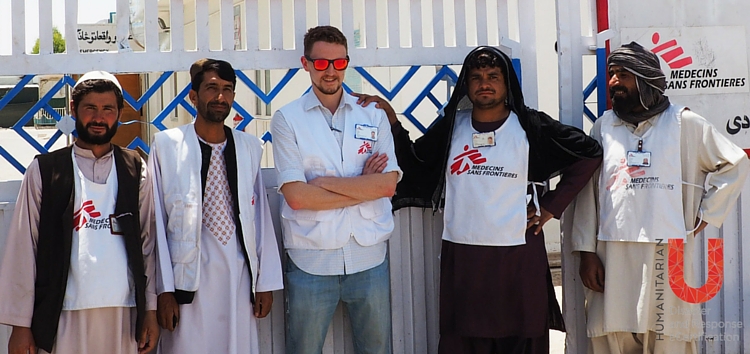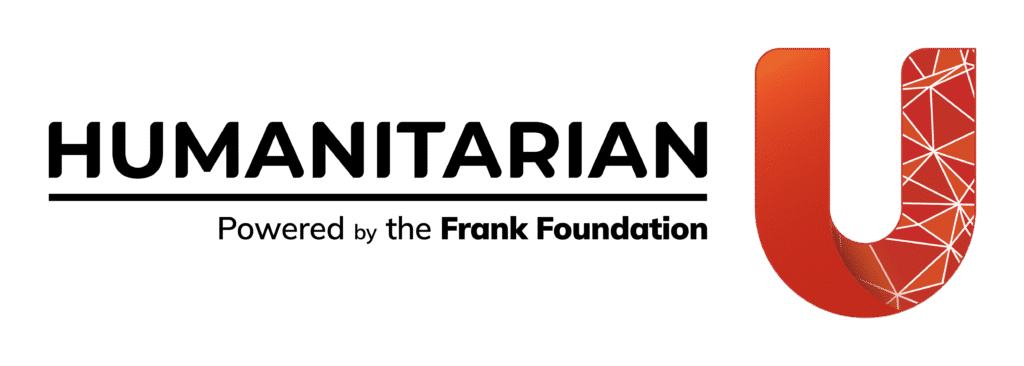A young traveller turned humanitarian, Will Plowright is an expert on security in humanitarian operations, trends in conflict involving armed groups, negotiation of humanitarian space in conflict zones, and the use of child soldiers.
His vast experience includes working in conflict zones such as Afghanistan, Syria, Myanmar and South Sudan. Will has also interviewed members of organizations such as ISIS and the Lord’s Resistance Army.
“Armed groups have changed their strategy and how they view humanitarian organizations. They realized how political humanitarian work really is”, he explains.
Read the final part of this amazing interview.
If you didn’t see the first half, you can read it here.
Humanitarian U – What are some strategies for humanitarian organizations negotiating access in conflict zones?
Will Plowright – Usually when humanitarians show up they have something to offer. So, one of the very acceptable ways of negotiating access is to state clearly the benefits that the organization can provide. For example, you say that you will set up a clinic, and that you’ll treat everyone, no matter who they are – a soldier who has been shot, or a mother with complications in her pregnancy, they all get treated.
Another way to start the negotiation is by explaining how armed groups can be seen as more legitimate through their engagement with the NGOs. Armed groups in general see themselves as states. By treating them like a state, you give them this sense of legitimacy. Like a state, they are engaging with international actors, simply by talking and negotiating access. But, again, even this may depend on the context.
HU – How do you approach language barriers when negotiating access in conflict zones?
Will – It’s certainly an asset to speak the local language. For us Canadians who can speak English and French, going into former colonial countries such as in Africa becomes easier in terms of language.
Also, anywhere humanitarian organizations work, the majority of the staff on that project is local. I don’t know of any real exceptions to that rule. The local staff are an incredibly important source of information. They are not going to just stand there and translate, but really help internationals understand the local context, culture, conflict, and needs. They are simply essential. Without them, nothing happens.
HU – What have you seen in terms of how Humanitarian Space is regarded during conflict?
Will – The last five or six years have seen an increase in attacks on humanitarians, specially in Syria and Iraq – which are some of the most difficult places to work in. International as well as national staff has been targeted, and most organizations haven’t had an attitude towards this problem yet.
Some tried to come up with projects called “remote management” or “remote control”, where they would try to run a project in Syria or Somalia – a place where they really can’t go – by working with national staff only.
The problem is that in those cases they have no real idea of whether the project is actually working, or if the people they hired are actually doing the jobs they were hired for. And they can’t actually go in and check.
In general, the humanitarian landscape has changed in terms of security in the last 10 years. There are places where we really can’t work anymore.
HU – What contributed to this landscape change?
Will – Armed groups have changed their strategy and how they view humanitarian organizations. They realized how political humanitarian work really is.
HU – Do you think these groups don’t see humanitarian organizations as neutral anymore?
Will – One of the core issues humanitarians face is neutrality. Regardless of humanitarian organizations seeing themselves as neutral, the challenge they are essentially facing is how to make everyone believe that they are neutral. In many places like Syria or Somalia the local armed groups do not see these international actors as neutral. They see them as political actors.
A reason for that is the deep involvement of Western military forces in conflicts such as Iraq and Afghanistan. Countries like the United States and United Kingdom have a military counterinsurgency strategy that includes developing projects – schools, hospitals and other services for the local community. The problem is that sometimes they may not identify themselves as military.
In other places, the military or the government will fund certain NGOs locally, who technically aren’t under the control of the military, but realistically they are, because they set up projects in strategic areas.
They intentionally provide humanitarian relief through the military without making this line clear to the local community. They want to look as humanitarians, and end up making humanitarians look like they are military. They blur the boundaries between who is actually a humanitarian and who isn’t.
The local community can’t necessarily tell the difference between a school that is being run by the Americans, and a hospital that is being run by a neutral organization.
The military isn’t neutral or impartial. So, for an organization that is neutral and impartial, it’s very difficult to come in and try to make it clear that you are not the same as those other projects. And to a local person, all they see is a bunch of foreign organizations they have never heard of, coming in and running projects.
HU – What are some guidelines you could give to humanitarian workers who are going into a conflict zone and might face these kinds of issues?
Will – Basically, it’s very important to identify yourself to the community, make sure they know who you are and what have you come there to do – create an image for yourself. That way you can state that you are neutral and impartial.
Then you have to go about proving it. So, not only do you tell people that you are doing things, but you make sure that you are doing them. And the way you accomplish that is by constantly talking to members of the local community at all levels: government, armed groups, religious leaders, people on the streets, patients, everyone.
Make sure that you are dealing with the problems that they identify, that they want you to be there, and that they see you as being different.
HU – In relation to the issue of child soldiers, which is one of the focuses of your research, do you see the problem being addressed or getting worse?
Will – I guess it depends on where you look at it. Overall, no one really knows how many child soldiers there really are in the world. Anyone who puts a number forward is just making an educated guess.
In some places there have been long-term projects trying to encourage armed groups to demobilize their child soldiers. These projects try to engage with the armed groups to help them do it, rather than just blaming them for it. They help the group acknowledge that as a problem and deal with it.
So, for example, Myanmar used to be one of the worst places in terms of use of child soldiers. However, there has been a lot of progress, made by organizations such as Geneva Call and the United Nations, in engaging and helping armed groups demobilize their child soldiers.
It is not a simple problem to address. You can’t just tell the children to “go away” and be done with it. They usually don’t have formal identification such as a passport; they may not know their age; some may lie about their age because they want to fight; sometimes they just want a job; sometimes they think it’s cool to be part of an armed group; etc. So, it’s a challenge to try to demobilize them.
There are success stories in some countries. But in places such as Syria and Iraq, there has been a new type of militarization of young people and, regardless of the formal number, it’s a lot of people. It’s a problem that is very difficult to address.
HU – What would be a way to address it?
Will – There is no easy answer. It’s not a problem that will be resolved in six months, or even in six years. For the moment, continuing to try to engage with armed groups, trying to get them to follow international humanitarian law, whenever possible. Also, being public about the groups who don’t use children. Not just condemning the ones that do, but identifying the ones that don’t. The reality is, though, that as long as the conflict is as vile as it is right now, the problem is going to persist, and there is no simple solution.
HU – What would you say to someone who wants to invest in a humanitarian career?
Will – I would say that it’s a great profession to be involved in. You meet amazing people, go to amazing places, and, if you are lucky, you get to do amazing work.
The sooner you start planning and preparing yourself the better. Don’t just say, “I want to be a humanitarian”, but identify what type of humanitarian work you want to do. Are you going to be a nurse, or a doctor, or a logistician? Identify the position you might want, the organization that you want to work for, and find out what experiences you need.
Get the experience and the training, so that when you apply, it’s not just you who wants to work for them. They will want you, because you have the mix of experience and formal training that really sets you apart from all the people who apply. The reality is that a lot of people apply, and most don’t have the experience or the training, and they don’t get the job.
Most humanitarian organizations recognize the benefits of hiring people who already have formal training, be it an online or simulation training. These people are not starting from square one; they know what it actually means to work in the humanitarian sector, even if they haven’t yet. They understand the kinds of problems that humanitarians face, even if they have never been to a conflict or disaster zone. And this sets them apart. It shows that they are committed and dedicated, not only to getting that job but also to doing it well.

